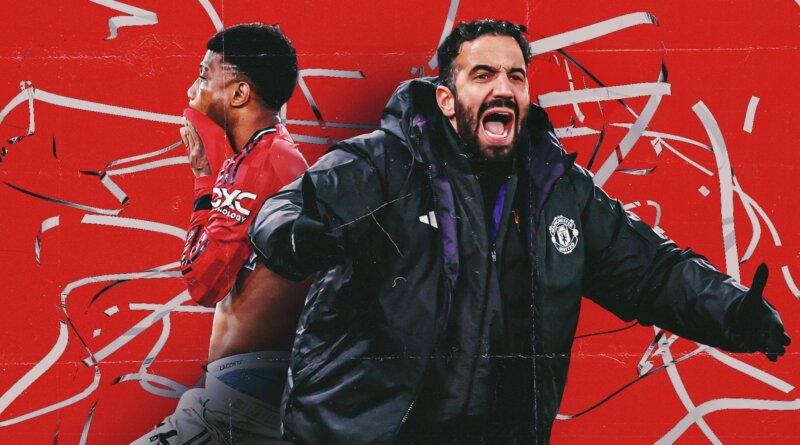Ruben Amorim’s Manchester United Formation Under Fire After Everton Defeat
Ruben Amorim’s Manchester United formation came under renewed scrutiny after a disappointing loss to Everton, with critics and fans alike questioning the coach’s tactical rigidity and inability to adapt during high-stakes Premier League matches.
Ruben Amorim’s Manchester United Formation: A System Under Strain
Ruben Amorim’s Manchester United formation has become a hot topic following a frustrating anniversary match against Everton. Despite playing with a man advantage for over 77 minutes, United looked bereft of ideas and were ultimately beaten 1-0. This result left many wondering if Amorim’s steadfast commitment to his 3-4-3 setup is stifling the squad’s potential.
One Year In, Still Searching for Cohesion
After a year at the helm, Amorim’s tactical imprint should be evident. Yet, against mid-table Everton, United appeared no closer to finding solutions when presented with unique match circumstances. In his post-match remarks, Amorim lamented the lack of intensity from his players, contrasting their apathy with Everton’s spirited in-fighting, which culminated in Idrissa Gueye’s red card. Still, he shouldered responsibility, stressing the need to instruct his squad in all situations.
The 3-4-3 Formation: Too Rigid for Modern Demands?
The heart of the issue lies in Amorim’s unwillingness to deviate from his preferred 3-4-3 formation—even when the scenario called for tactical flexibility. When Everton went down to ten men early, United failed to capitalize, relying heavily on wide play that quickly became predictable. The midfield, anchored by Casemiro and Bruno Fernandes, was neutralized, forcing United to attempt attacks from the flanks, where neither Patrick Dorgu nor Noussair Mazraoui could break through.
Wing-Backs Fail to Deliver
At half-time, Amorim introduced Mason Mount for Mazraoui, reverting Amad Diallo to right wing-back. Yet, the left flank remained ineffective, even with attacking full-back Luke Shaw on the pitch. Instead of utilizing Shaw’s experience, Amorim brought on the right-footed Diogo Dalot on the left, narrowing United’s attacking threat and allowing Everton’s defense to settle.
Missed Opportunities and a Lack of Imagination
Despite possessing superior numbers, United’s best chances came from desperate crosses rather than incisive build-up. Joshua Zirkzee’s two headers—saved superbly by Jordan Pickford—remained the only real threats. Everton’s central pairing, James Tarkowski and Michael Keane, dealt comfortably with aerial balls, highlighting United’s lack of variety.
Ruben Amorim’s Manchester United Formation Faces Criticism
Pundits, including Gary Neville and Jamie Carragher, were vocal in their criticism. Neville pointed out the lack of urgency and movement, lamenting that Shaw, a natural left-back, was shoehorned into a defensive role that restricted his attacking instincts. Carragher echoed these views, suggesting that Amorim’s rigid tactical philosophy prevented players from maximizing their strengths.
No Clear Plan Against Ten Men
The absence of a tailored approach to playing against ten men was glaring. Instead of stretching the field and exploiting space, United’s possession was slow and predictable. With key forwards Matheus Cunha and Benjamin Sesko sidelined, Amorim refused to blame injuries, insisting the team had the quality to win. However, the looming loss of key players to the African Nations Cup will further test his adaptability.
Are United’s Talents Being Wasted?
Amorim has often claimed that desire, not formation, is the key to results. Yet, performances suggest otherwise. Players appear constrained, unable to express themselves within the system. This was evident as United struggled to break down Everton’s low block, a scenario that called for more creativity and risk-taking.
Looking Forward: The Need for Change
With a big December fixture list ahead and injuries mounting, Amorim must show the flexibility to adapt his strategy. The Premier League demands tactical nuance, and sticking rigidly to a single approach could derail United’s ambitions for the season.
For more news and analysis, visit for more news.
Opinion: Adaptation Is Key for Amorim’s Future
The defeat to Everton encapsulates the current predicament: a talented squad constrained by tactical inflexibility. Amorim’s insistence on the 3-4-3 formation risks undoing his progress at Manchester United. To unlock the full potential of his players and compete at the top, Amorim must embrace change and tailor his approach to the demands of each match. Adaptation, not stubbornness, is what will shape his legacy at Old Trafford.
Your global gateway to nonstop football coverage:
News Goal
Share this content:
